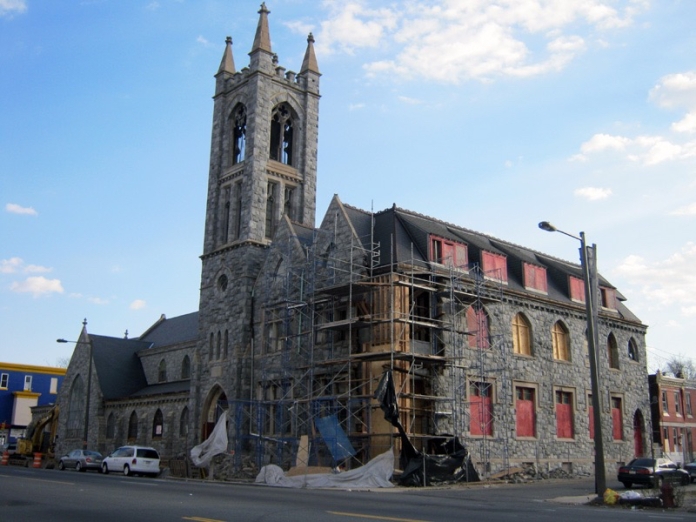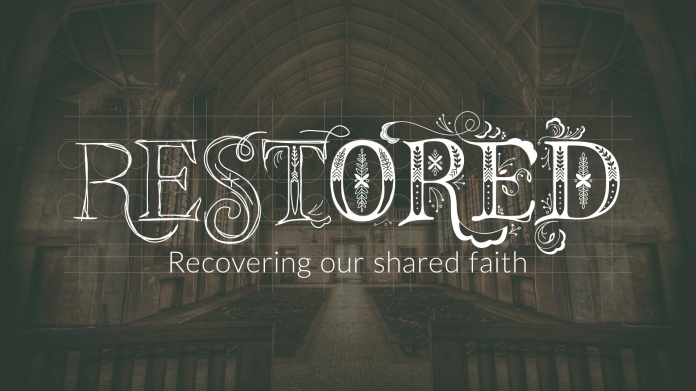[Greetings, all. I have communicated the below information to my congregation, colleagues, and some friends. However, I realized that it may be beneficial to share this in a more broad manner to those with whom I’ve connected through ministry, neighborhood life, friendship, and the many other ways our life paths cross. The quick version is this: I’m stepping down from my position as neighborhood pastor at Gallery Church Patterson Park to enter a time of preparation and focus for what may be next.]
[One thing I’ve realized is that there are far too many ways to communicate, and it is impossible to engage these media without having some of you be inevitably left out. I sincerely apologize if you are one of the ones who feel left out. If nothing else, it may just indicate that we need to connect in other ways!]
So, what follows is the letter I wrote to my congregation. Feel free to reach out to me with questions. If you are the praying type, I would appreciate your prayers as we step into a new season of life.
Dearest Gallery Church Family:
After much prayer, consideration, wrestling, and discernment—and with the blessing of other leaders, elders, and my wife, Kara—I am resigning as the neighborhood pastor of Gallery Church Patterson Park. I share this news with a sad and heavy heart and with a hopeful expectation for the future.
Almost nine years ago, at Pastor Ellis and Ginger Prince’s invitation, I moved to Baltimore with a handful of other people to help start the Gallery Church. We believed that a small group of people, with love in their hearts for God and their neighbors-to-be, could see real change happen in our neighborhoods. I still believe it, and what is more, I have seen it. Our God has been at work in his people in our city.
Since then, I have had the opportunity and responsibility to serve our church and city in so many ways. I am amazed and humbled as I think of those with whom I have had the privilege of serving. I cannot adequately state how much I have learned in my time serving with Gallery Church. I have been changed profoundly during my time here. I discerned a call to vocational/pastoral ministry here and have truly grown up here, spending almost a third of my life in ministry with Gallery. This church has taught me what it can mean and look like to walk together in challenging and joyful times.
And now, this journey continues for me. In transitioning from this position, Kara and I are taking a step of trust with the Lord. We do not have another church job lined-up. We are not planning on moving, but we are going to be entering a time of preparation. I will be investing some more time in my schooling to finish my degrees. I will continue to work part-time with HopeSprings, and I will be taking time to re-discover and seek clarity in my identity and calling. We sense that this is a necessary and important time for whatever lies ahead. What form that calling/vocation may take in the future, we are unsure, but we have a strong and enduring peace about taking this step, knowing full well it will be difficult and challenging for us and others.
Let me help to speak to a few questions or thoughts that you or others may be having. Many pastors tend to resign in the midst of controversy, that is not the case here. I want to be as clear as I can here: I have not had any sort of moral failure which would disqualify me from ministry. Kara and I are doing well in our marriage, growing in our love for each other and the Lord, and are united in this decision.
Additionally, there are not any secret or unsaid reasons for my resignation. In times like this, rumors can abound and certain “gaps” in the information can be filled in with gossip or speculation. There is not any enmity between me, or any of the leaders or staff in our Gallery Church Family. I have been challenged and blessed by the diversity of our staff team and by those with whom we have labored in our city. I love them, believe in them, and no difference of opinion or issue has contributed to this decision. I believe in what God is doing at Gallery and in our city, and I pray for God’s greatness to be continually displayed in our church family.
Lastly, some of you may be wondering if we will still be “around”—meaning, attending at Gallery Church in the coming months. We have no desire to “cut-ties” with Gallery. We still view you all as dear sisters and brothers and neighbors, so you will see us from time to time. Pastor Ellis has been very gracious and kind to continue to offer times for me to be with you, and to use my gifts when appropriate. We will be taking a few months to seek continued counsel, to worship with other faith communities in our region, and to pray through our family’s rhythms of life. We also feel that some initial “distance” will be the best way to love our Patterson Park family as they collectively discern what God is doing next. My last Sunday serving as the neighborhood pastor at Gallery Patterson Park will be January 15th, 2017.
Gallery Church Patterson Park has a unique and specific calling to uncover and run after. I truly believe that, and I believe God is already at work to provide for this next season. One of the benefits of belonging to a wider church family is that we have sisters and brothers who can support and walk with you in this time of transition. Jayme Swanson (our neighborhood elder), Pastor Bill Medina (our Associate Pastor), Aida Medina (Cross-Cultural Ministries), and Pastor Ellis will be working together with other key leaders at Patterson Park, and our Central Ministries team to help lead and serve the church in this next season. They will be ensuring that our gatherings and growth community life continue on with care and oversight.
So here is what I will ask you to consider doing in the coming days:
Pray— I know this sounds like the thing you are supposed to always say, but I could not be more emphatic. God has desires for Gallery Church Patterson Park that he wants to make known. There will be an upcoming time of Prayer and Fasting with Gallery Church Downtown from Jan 17-21 each evening. I encourage you to take time as a church family or as a growth community to come and to pray for Patterson Park and what’s next.
Invest— It is in times like this where the members of the church can sometimes sit back and wait to see what will happen. I encourage you to take this as a season of investment, both financially and spiritually. Please continue to give faithfully and sacrificially. Please take the time to get involved in serving. This is your time to be the church you hope to see.
Ask— Times like this can bring up questions and sometimes confusion. It’s more than ok to ask questions. I cannot promise we have an answer to every question, but we will listen and be available as much as possible until we transition in January.
This letter is not easy to write. Kara and I have felt grief and sadness as we have struggled with this decision, and we have wrestled with how to love you best during this time. I love you all and I am so thankful to have had the privilege to serve as your pastor over these last years.
May God’s Grace and Peace be with you,
Derek H. Miller
Advent, 2016





